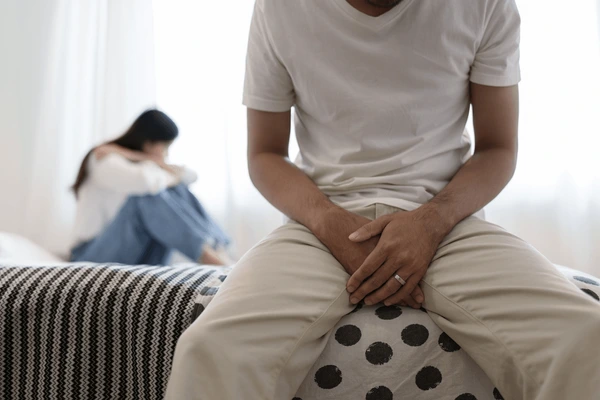Erectile dysfunction (ED) physical activity improves blood flow, reduces stress, and enhances overall health, essential for maintaining sexual function. Cardiovascular exercises, such as running, swimming, and cycling, strengthen the heart and blood vessels, improving circulation. Strength training boosts testosterone levels, further supporting sexual health. Additionally, exercise helps in weight management, reducing the risk of ED associated with obesity.
Strength training
- Strengthen muscles that support erectile function
- Improve lower body strength and testosterone levels
- Engage multiple muscle groups and boost overall strength
- Enhance upper body strength and improve core stability
Incorporating strength training into your routine helps increase testosterone levels and improve overall body composition. Focus on compound exercises that work for multiple muscle groups simultaneously if you need clarification on working with a certified personal trainer.
Flexibility and balance exercises
- Yoga-Improves flexibility, reduces stress, and enhances body awareness
- Pilates- Strengthens core muscles and improves posture
- Tai Chi– Promotes relaxation and improves balance
These exercises improve physical health but also help reduce stress and anxiety, which contribute to ED. Regular practice, can lead to better body awareness and improved sexual function.
High-intensity interval training (HIIT)
- Alternating periods of intense exercise and short recovery periods
- Can include exercises like burpees, mountain climbers, and jump squats
- Improves cardiovascular health and boosts metabolism
HIIT workouts are time-efficient and highly effective for improving overall fitness. They can be particularly beneficial for men with ED, as they promote better blood flow and hormone balance.
Role of consistency and progression
While incorporating these exercises into your routine is important, consistency is critical. Regular exercise over time leads to significant improvements in ED symptoms. It’s also crucial to progressively increase the intensity and duration of your workouts as your fitness level improves. These clinics offer comprehensive evaluations and recommend specific exercise routines tailored to individual needs. An ED Clinic Appleton may also provide additional therapies that complement exercise in managing erectile dysfunction.
Lifestyle factors to consider
In addition to exercise, other lifestyle factors can impact ED.
- Maintain a healthy diet- Focus on whole foods, fruits, vegetables, and lean proteins
- Stay hydrated- Proper hydration is essential for overall health and sexual function
- Get adequate sleep- Aim for 7-9 hours of quality sleep per night
- Manage stress-Practice relaxation techniques like meditation or deep breathing
- Limit alcohol and quit smoking-These habits negatively affect sexual function
Combining a healthy lifestyle with regular exercise can significantly improve ED symptoms and overall well-being.
When to seek medical advice
While exercise can be beneficial for many men with ED, it’s essential to consult healthcare before starting any new exercise program if you have underlying health conditions. A medical professional can guide you in implementing safe and effective exercise routines based on your health status.
Tracking progress and staying motivated
- Keep a workout journal to monitor your progress
- Set realistic goals and celebrate small achievements
- Find an exercise buddy or join group fitness classes for added motivation
- Mix up your routine to prevent boredom plateaus
Remember that improvements in ED symptoms may take time. Stay patient and consistent with your exercise routine; you’ll likely see positive changes in your overall health and sexual function. Listen to your body, progress gradually, and don’t hesitate to seek professional guidance when needed. With dedication and consistency, you harness the power of exercise to improve your sexual health and overall well-being.





